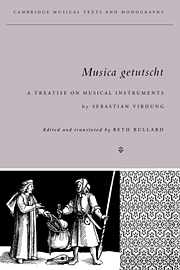Book contents
- Frontmatter
- Contents
- Preface
- List of abbrevations
- PART I TRANSLATOR'S INTRODUCTION
- 1 Why study Musica getutscht?
- 2 A biography of Sebastian Virdung
- 3 The publication history of Musica getutscht
- 4 The offspring of Musica getutscht
- PART II MUSICA GETUTSCHT
- Appendix Transcriptions of documents pertaining to Sebastian Virdung and Musica getutscht
- Notes
- Bibliography
- Index
4 - The offspring of Musica getutscht
Published online by Cambridge University Press: 14 August 2009
- Frontmatter
- Contents
- Preface
- List of abbrevations
- PART I TRANSLATOR'S INTRODUCTION
- 1 Why study Musica getutscht?
- 2 A biography of Sebastian Virdung
- 3 The publication history of Musica getutscht
- 4 The offspring of Musica getutscht
- PART II MUSICA GETUTSCHT
- Appendix Transcriptions of documents pertaining to Sebastian Virdung and Musica getutscht
- Notes
- Bibliography
- Index
Summary
We have seen that within the first two decades after its publication, Musica getutscht generated two adaptations into other languages (Musurgia and Dit) and a direct translation of the second of these into yet another language (Livre). We have also seen that Virdung's treatise lived on as well in a German work by Martin Agricola: Musica instrumentalis deudsch. The authors of these four derivative works selected some of the elements contained in Musica getutscht and presented these in contexts that differed from the original.
“Musurgia seu praxis musicae” by Othmar Luscinius
Othmar Luscinius – noted scholar, musician, and theologian – produced the earliest offspring of Musica getutscht in his Latin treatise, Musurgia seu praxis musicae. The manuscript (not extant) that generated the 1536 print dates from ca. 1517. Of the two sections that comprise this work, only the first is beholden to the contents of Virdung's published effort. The second part contains two “commentaries”: one on the principles of mensural notation and the other on rules for composing polyphonic music. Both of these were subjects that Virdung had saved for his larger, unpublished (and now lost) “A German Musica.” Although the work came about as the result of a request by the Milanese publisher and bookseller, Andreas Calvo, that Luscinius translate Virdung's treatise for the benefit of those unversed in the German language, Musurgia has an almost entirely new text – one that the author based only loosely on the prototype.
- Type
- Chapter
- Information
- Musica GetutschtA Treatise on Musical Instruments (1511) by Sebastian Virdung, pp. 61 - 88Publisher: Cambridge University PressPrint publication year: 1993



